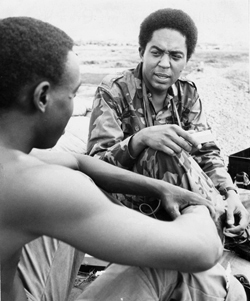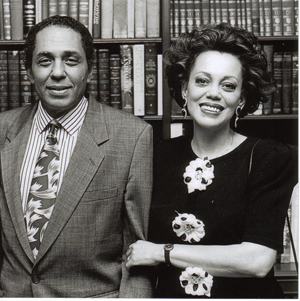Wallace Terry facts for kids
Wallace Houston Terry, II (born April 21, 1938 – died May 29, 2003) was an African-American journalist and oral historian. An oral historian collects and records people's stories about their lives. He is best known for his book Bloods: An Oral History of the Vietnam War (1984). This book shared the experiences of black soldiers in the Vietnam War. It even inspired movies like Dead Presidents (1995) and Spike Lee's Da 5 Bloods (2020).
Wallace Terry had a very interesting and varied career. He was mainly a journalist, but he was also a minister. He worked in radio and TV, gave many speeches, and even worked in advertising. He also taught journalism at Howard University and The College of William & Mary.
Contents
Wallace Terry's Early Life and Education
Terry was born in New York City. He grew up in Indianapolis, Indiana. In high school, he was an editor for the Shortridge Daily Echo, which was a daily newspaper for students.
Later, as a reporter for The Brown Daily Herald at college, he interviewed Orval Faubus. Faubus was the governor of Arkansas who supported segregation, which meant keeping people of different races separate. A photo of Terry shaking hands with Faubus was on the front page of The New York Times in 1957. Terry later became the editor-in-chief of his college newspaper. He was the first African American to lead a newspaper at an Ivy League university. He continued his studies at the University of Chicago and Harvard University.
His Career as a Journalist and War Correspondent
Terry started working for The Washington Post in 1960 when he was just 19. Three years later, he joined Time magazine. In 1967, Terry went to Vietnam. He became the magazine's deputy bureau chief in Saigon. He was the first black war correspondent to be stationed there permanently.
During his two years in Vietnam, he reported on important events like the Tet Offensive. He flew many combat missions with American and South Vietnamese pilots. He also joined soldiers in battles like those in the Ashau Valley and on Hamburger Hill. He even helped retrieve the bodies of four newsmen killed by the Viet Cong during a battle in Saigon in 1968.
In 1967, Terry wrote a Time cover story called "The Negro in Vietnam." His famous book, Bloods: An Oral History of the Vietnam War by Black Veterans, came out in 1984. The New York Times said that the people in the book shared their stories with great honesty. They helped readers understand what it was like to be a black man serving in Vietnam and returning home.
Terry also created a unique documentary recording from the Vietnam battlefields. It was called Guess Who's Coming Home: Black Fighting Men Recorded Live in Vietnam. Motown released it in 1972. He also wrote and narrated "The Bloods of Nam" for the PBS Frontline TV show.
His Later Life and Legacy
In 2003, Wallace Terry became ill with a very rare disease. It is called granulomatosis with polyangiitis. Sadly, it was discovered too late for treatment. He passed away on May 29, 2003, in a hospital in Fairfax, Virginia.
He was survived by his wife, Janice Terry, and their three children: Tai, Lisa, and David. He also had two grandchildren, Noah and Sophia.
When he died, Terry was working on another book. It was called Missing Pages: Black Journalists of Modern America: An Oral History. This book was published after his death in 2007. A journalist named Cynthia Tucker called it a "treasure trove of history."
Books by Wallace Terry
- Bloods: An Oral History of the Vietnam War by Black Veterans (ISBN: 978-0-394-53028-4)
- Missing Pages: Black Journalists of Modern America: An Oral History (ISBN: 978-0-7867-1993-8)
See also
 In Spanish: Wallace Terry para niños
In Spanish: Wallace Terry para niños



